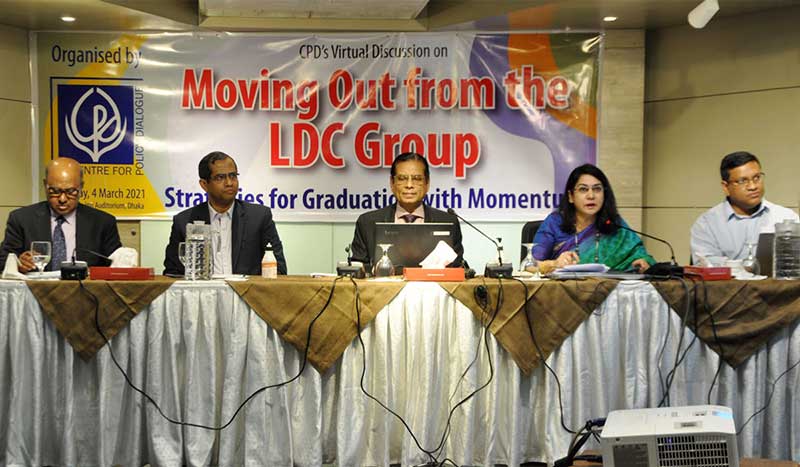
Bangladesh will graduate from the least developed country (LDC) category by 2026. This will bring both opportunities and challenges. Therefore, Bangladesh will need to graduate with momentum so that graduation is sustainable. Graduation with momentum for transition to developing country status will call for a whole society and whole of country approach involving government, business and entrepreneurs, non-state actors and effective institutions and good governance.
Graduation from LDC to non-LDC developing country will open up new opportunities – Global branding and image; Perception about capacities and risks; Credit rating (sovereign bond, private Sector raising capital in foreign markets); Attracting investment by taking advantage of new branding and positive perception. However, there are also many challenges associated with graduation.
These observations emerged at the CPD’s Virtual Discussion on Moving out from the LDC group: Strategies for graduation with momentum, held on Thursday, 4 March 2021. The guests at the dialogue joined virtually while many journalists joined the dialogue at the BRAC Centre Inn, Auditorium.

CPD’s Executive Director, Dr Fahmida Khatun moderated the session. In her welcome remarks, she stated that it is a matter of pride that Bangladesh has fulfilled all three criteria to graduate from the LDC group in 2026. This will bring a number of opportunities for Bangladesh. The image and branding of the country will improve as graduation indicates the strength and capacity of Bangladesh economy. This will attract foreign investment. Bangladesh’s credit rating will also improve which will help secure commercial loans at flexible terms from the international market. However, graduation will also bring along a number of challenges since several international support measures (ISMs) will be withdrawn once Bangladesh becomes a non-LDC. Among these include withdrawal of duty-free quota free market access for Bangladeshi products, and other special and differential treatments. She mentioned that during the next five years of its transition, Bangladesh will have to work towards economic recovery from the ongoing pandemic while continuing to address the graduation related challenges.
The keynote presentation titled, “Bangladesh Transitioning to Developing Country: Strategies for graduation with momentum”, was made by Professor Mustafizur Rahman, Distinguished Fellow, CPD. In his presentation, he stated that Bangladesh should make best use of the next 5 years towards smooth graduation, graduation with momentum and sustainable graduation. In doing so, Bangladesh must address the graduation challenges in addressing adverse implications of loss of ISMs, building on Bangladesh’s strengths and successfully addressing COVID-related challenges, and implementing strategies in preparation for post-LDC future. He further added that impacts of LDC Graduation will be felt in four areas – market access; dealings with trade partners; policy freedom; and compliance enforcement. Four transitions will be called for in view of this: 1. Transition from preferential market access-driven competitive strengths to productivity and skills-driven competitive strengths; 2. Transition from non-reciprocity to reciprocity in dealings with external partners; 3. Transition from flexibility-driven policy space to obligation-driven policy space; and 4. Transition from lax compliance enforcement to more stringent enforcement of compliance requirements. His presentation also shed light on initiatives in going forward towards graduation with momentum.
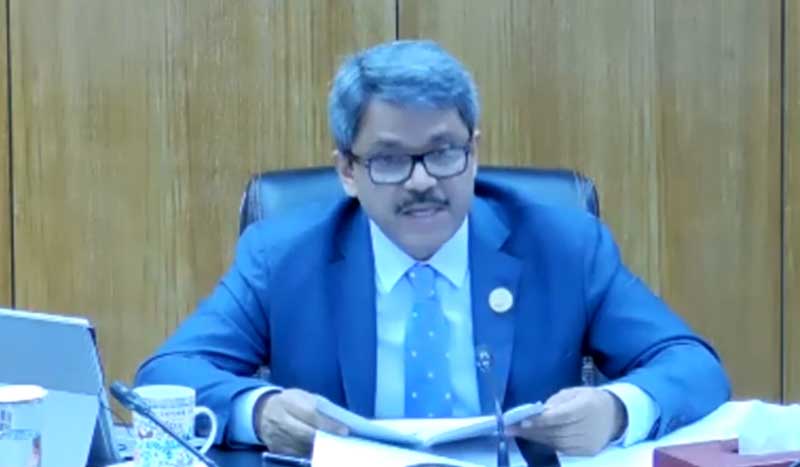
The Chief Guest of the dialogue, Mr Md Shahriar Alam, MP, Hon’ble State Minister for Foreign Affairs, Government of Bangladesh, shared similar view that the LDC graduation will bring both new opportunities and challenges. He feels that the graduation will help Bangladesh create a better image globally which will attract more foreign investors to invest in Bangladesh.
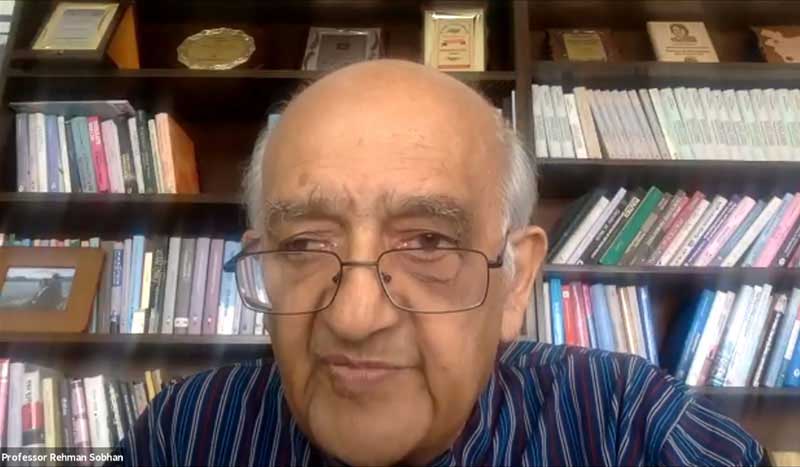
Professor Rehman Sobhan, Chairman, CPD and the Chair of the dialogue re-emphasised on the graduation time line being 2026 and stated that the LDC advantages that Bangladesh enjoys currently will be reaped off gradually at various times. He specifically mentioned on preparing for the new challenges in the global competitive market for the export oriented products of Bangladesh.

Bangladesh needs to convert this window of challenges in window of opportunity stated Mr Kazi Nabil Ahmed, MP, Member, Parliamentary Standing Committee on Ministry of Foreign Affairs, the Special Guest at the dialogue. He called for collective efforts from all in this regards.

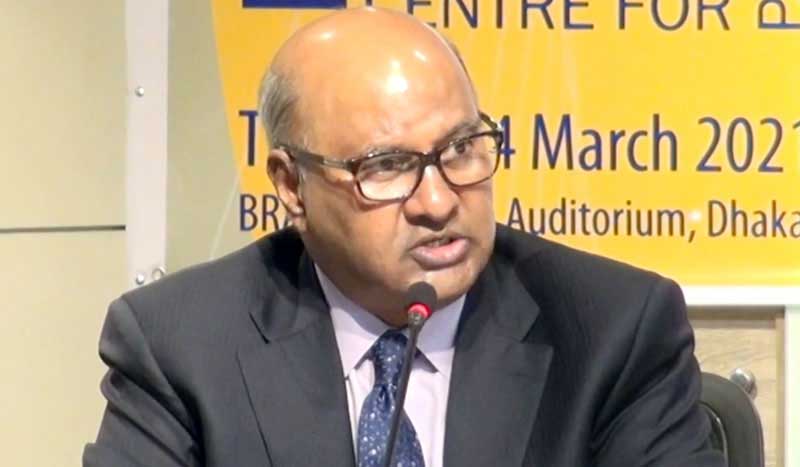
Dr Rubana Huq, President, Bangladesh Garment Manufacturers and Exporters Association (BGMEA) and Managing Director, Mohammadi Group; Mr A Matin Chowdhury, Managing Director, Malek Spinning Mills Ltd and Former Chairman, Bangladesh Textile Mills Association (BTMA); Mr Tuomo Poutiainen, Country Director, ILO Country Office, Dhaka; and Mr Naser Ezaz Bijoy, Chief Executive Officer, Bangladesh, Standard Chartered Bank delivered their remarks at the dialogue as Distinguished Discussants.

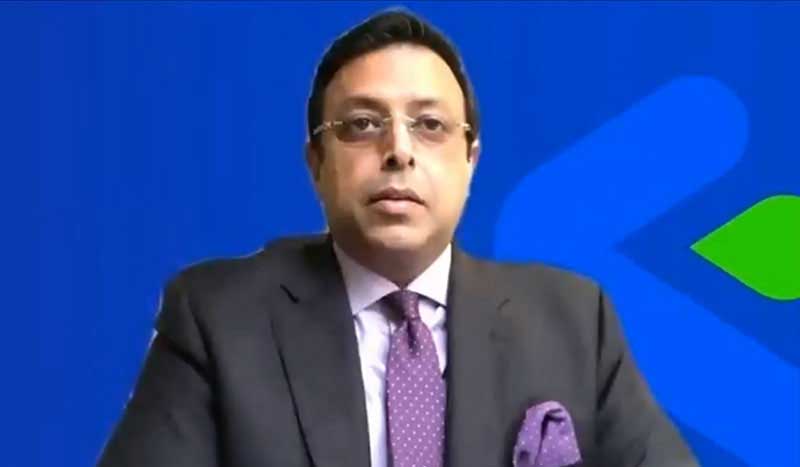
The dialogue was attended by government officials, business leaders, development activists, experts and academia, representatives from the development partners and media professionals.

